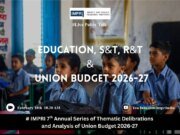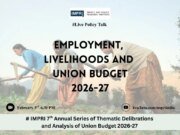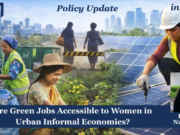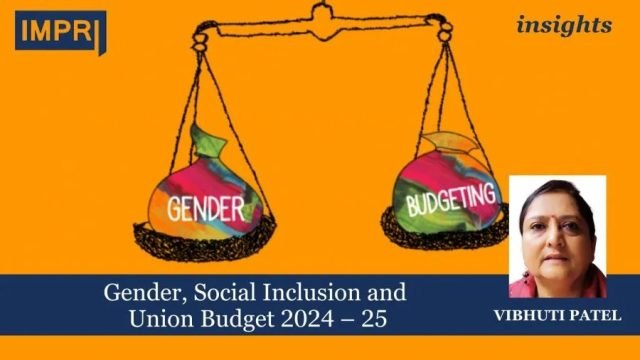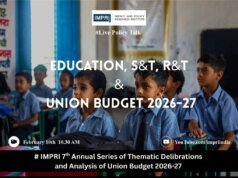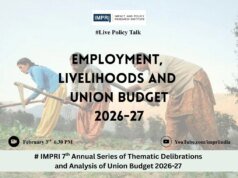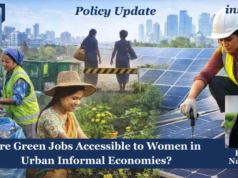Prof Vibhuti Patel
The Union Budget , 2024-25 has made promises in terms of (i)Productivity and resilience in Agriculture (ii) Employment & Skilling (iii) Inclusive Human Resource Development and Social Justice (iv) Manufacturing & Services (v) Urban Development (vi) Energy Security (vii) Infrastructure (viii) Innovation, Research & Development (ix) Next Generation Reforms. This agenda has great implications for gender equity and social inclusion concerns of the large majority of Indians facing multiple intersectional marginalities of class, caste, ethnicity, religion, location, ability and gender spectrum. For past 2 decades, the gender economists and for last 5 years network such as Feminist Policy Collective (FPC) have been emphasising an urgent need for Intersectional, Participatory, Decentralized & Outcome-based Gender Responsive BUDGETING.
This year, the gender budget schemes are divided into 3 parts. Part A encompasses the schemes that are targeted 100% to women, Part B includes schemes with 33% to 99% allocations for women and Part C with schemes which have less than 30% allocation for women. It perceives gender in the binary framework and the human development needs and demands of transgender community in terms of education, employment and skilling, health, shelter, decision making are largely neglected.
Allocations of 300 crore for women’s initiatives without a time-frame and clearly spelt out strategy can be problematic. We have experienced that with regards to Nirbhaya Funds and also Beti Bachao Beti Padhao funds.
In her budget speech, honourable Finance Minister announced that the budget will facilitate higher participation of women in the workforce through setting up of working women hostels in collaboration with industry, and establishing creches. In addition, the partnership will seek to organize women-specific skilling programmes, and promotion of market access for women SHG enterprises.
In Skilling programme, she informed about a new centrally sponsored scheme, as the 4th scheme under the Prime Minister’s package, for skilling in collaboration with state governments and Industry. 20 lakh youth will be skilled over a 5-year period. 1,000 Industrial Training Institutes will be upgraded in hub and spoke arrangements with outcome orientation.
She also declared the implementation of schemes meant for supporting economic activities by craftsmen, artisans, self-help groups, scheduled caste, schedule tribe and women entrepreneurs, and street vendors, such as PM Vishwakarma, PM SVANidhi, National Livelihood Missions, and Stand-Up India will be stepped up. The budgetary allocation of ₹2 lakh crore for education, employment and skilling need detailed examination in terms of is included and who is excluded from the state support.
Under the PM Awas Yojana Urban 2.0, housing needs of 1 crore urban poor and middle-class families will be addressed with an investment of ₹ 10 lakh crore. This will include the central assistance of ₹ 2.2 lakh crore in the next 5 years. A provision of interest subsidy to facilitate loans at affordable rates is also envisaged.
But in the current budget, the livelihoods of the urban poor has received less attention. Budgetary allocation for the National Urban Livelihoods Mission (NULM) programme has been reduced to INR 300 crores from the revised estimates of INR 523 crores in 2023-24. Even the PM SVANidhi (Prime Minister Street Vendor’s AtmaNirbhar Nidhi sees a budgetary cuts of Rs. 141.68 crores in 2024-25. The provision of 100 weekly ‘haats’ or street food hubs in select cities would hardly be able to address the livelihood challenges of millions of urban street vendors, self-employed poor and informal workers.
The Budget has continued its focus on infrastructure projects such as metro and Mass Rapid Transit System that account for 83 per cent of the central sector schemes in urban development. The Union Budget foresees transit-oriented development plans for 14 large cities with a population above 30 lakh. This will neither be affordable nor accessible to the average citizens. The budget has responded to the long standing demands of the daily local commuters by the public transport and allocated Rs. 1300 crores for 2024-25 under the PM e Bus Sewa Scheme.
The Union budget promises climate finance for enhancing the availability of capital for climate adaptation and mitigation. This will support achievement of the country’s climate commitments and green transition. There has been a paradigm shift in the budget, from productivity linked incentives to employment linked incentives. Pradhan Mantri Garib Kalyan Yojana has been extended for 5 years. The budget also highlights investment towards enhancing productivity and strengthening of agriculture.
The budget promises that the government will give the first month’s salary to the people getting employment in the organized sector. Both the employee and the employer will be given help. Apart from this, the government will also contribute to EPFO in the first 4 years of employment. Under this, the government will give an assistance of Rs 3000 every month to the employer. Apart from this, the government said on Tuesday that it will start three employment related schemes.
The Union Budget is silent about support to women farmers she promised in the interim budget under PMKSY Pradhan Mantri Krishi Sinchai Yojana (PMKSY) is launched on 1-7-2025. We are glad to see financial allocations for working women hostels & creches are mentioned in the budget.
As per Household Consumption Expenditure Survey (HCES)2022-23 by The National Sample Survey Office (NSSO), Ministry of Statistics and Programme Implementation (MoSPI), the 40% of Indian have to skip one meal a day. Kerala and Tamilnadu are the only states where 98% population manages to get 3 meals a day while in Gujarat and Rajasthan only 31% of population can afford 3 meals a day. This explains the role of social sector policy.
Our Budget must consider India’s fast changing population dynamics; and we must invest generously for the education, skilling, employment and well-being of the 370 million youth of the country and make huge human development investments in health, nutrition, housing, sanitation and improvement in air and water quality for majority of the masses.
There is no mention of persons engaged in manual scavenging, in entire Budget. Even the scheme meant for the rehabilitation of manual scavengers (SRMS) has been outrageously scrapped. Demand of Safai Karmacharis (sanitation workers) of reintroduction of education schemes for children of sanitation workers must be fulfilled. Education and employment of SC, ST, Minorites must be given a topmost priority.
MMR in India is 103 per one lakh live births, maternal and child health programmes, increasing investment in reproductive health services, and strengthening mental health support services specifically for women are essential steps. There is an urgent need for establishment of National Commission for Senior Citizens which has been a long standing demand of the organisations like Silver Innings and HelpAge India. All states and union territories must ensure functioning and 24-7 operational helpline 14567 for senior citizens.
Major initiative by the state is required to ensure quality employment for women in the workforce in all sectors-agriculture and allied activities, industry, cottage industry, gig work.
Economic empowerment is crucial, given that women-owned businesses comprise only 13.76% of the total entrepreneurs in India. Providing financial incentives and grants for women entrepreneurs, enhancing microfinance schemes, and ensuring easier access to credit for women will promote women’s participation in sectors like agriculture, manufacturing, and technology through targeted initiatives. Safety and legal protection cannot be overlooked.
According to the National Crime Records Bureau, 2023; there were nearly 4 lakh reported cases of crimes against women in 2020. Increasing funding for programmes aimed at reducing gender-based violence, starting one stop crisis centres, shelter homes, strengthening legal aid services for women, and supporting the establishment and operation of more women’s shelters and crisis centres are vital actions. Allocation of Nirbhaya Funds since 2013 must be utilised for institutional support to the survivors of gender based violence, child protection, rehabilitation of victims of trafficking.
Need for gender disaggregated data is of utmost importance for directing policies and funds-functions-functionaries to achieve social inclusion in response to multiple marginalities and vulnerabilities faced by large majority of the urban, rural and tribal toiling poor due to their socio-cultural locations . Investing in the working in the urban, rural and tribal masses is not an act of charity; it is a fundamental necessity for high economic growth.
Prof Vibhuti Patel is a retired Professor Tata Institute of Social Sciences, Mumbai and SNDT Women’s University, Mumbai and Distinguished Visiting Professor, IMPRI.
Gender, Social Inclusion and Union Budget 2024-25
Podcast: Spotify | YouTube Music
Read more at IMPRI:


